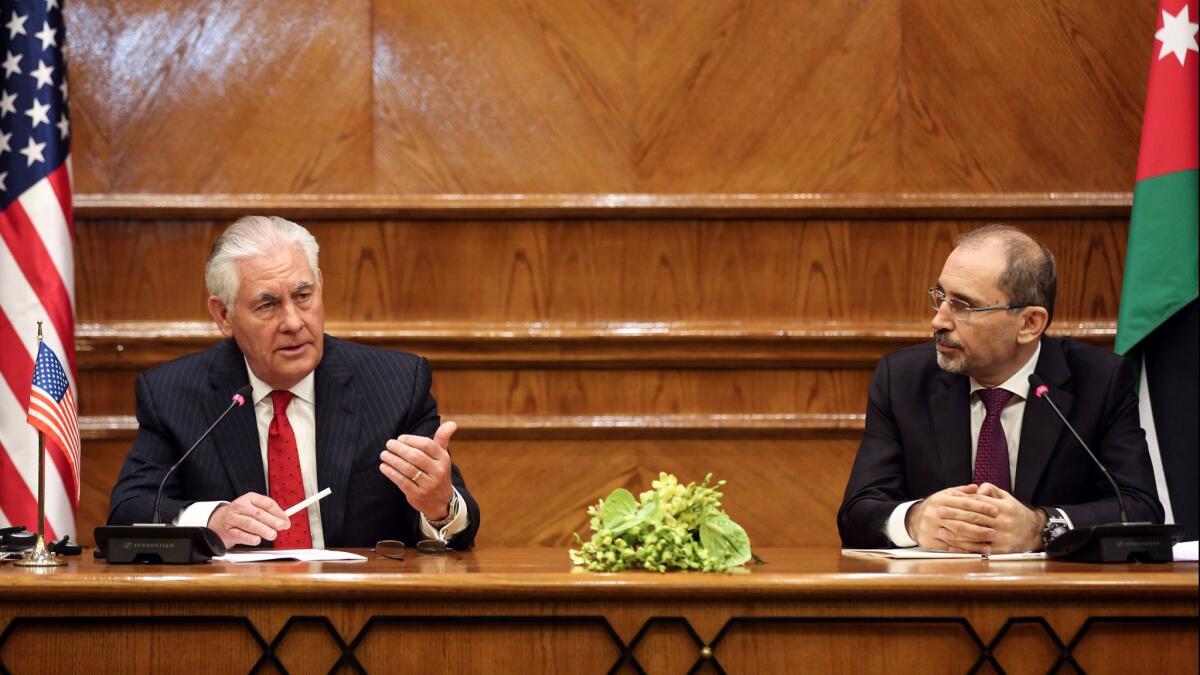U.S. pledges aid increase to Jordan, hints at developments in Middle East peace process

- Share via
Reporting from AMMAN, JORDAN — Secretary of State Rex Tillerson came to Jordan on Wednesday with the promise of a fattened aid package, engaging in a gilt-edged charm offensive designed to assuage tensions with Amman over moving the U.S. Embassy in Israel to Jerusalem as well cuts in aid to the Palestinians.
It was Tillerson’s third stop in a fence-mending Middle East tour following a year of disruptive moves by the Trump administration that have left traditional U.S. allies in the region, including Jordan and Turkey, fuming.Tillerson gave few hints of that tension in his opening remarks.
“For decades the U.S. and Jordan have sustained a truly indispensable strategic partnership that has been critical to the security of both of our nations. Today we recognize the importance of that partnership by signing this new five-year memorandum of understanding,” said Tillerson in a joint news conference with his Jordanian counterpart, Ayman Safadi.
“Under this agreement,” Tillerson added, “the U.S. commits to providing Jordan no less than $1.275 billion per year.”
The new agreement represents a 27% increase in the U.S.’ previous $1-billion annual commitment to Jordan, while bolstering its length from three to five years to give Jordan “greater certainty in planning for the future,” Tillerson said.
In his remarks, Safadi called the memorandum “a testimony to the enduring nature” of relations with the U.S., adding that it would help Amman carry out economic reforms and “meet our developmental and defense needs.”
Jordan is one of the top recipients of U.S. largesse, including millions of dollars in military aid from the Pentagon as well as humanitarian assistance for hosting hundreds of thousands of refugees from war-ravaged Syria.
The country is also home to a number of U.S. bases crucial for anti-Islamic State operations in Iraq and Syria. (The Pentagon announced last year it would pump $143 million into Muwaffaq Salti Air base, roughly 50 miles east of the Jordanian capital, more than any other overseas Air Force site.)
Both diplomats took pains to emphasize the good relations between the two countries, with Safadi telling Tillerson he was “among friends.” Tillerson responded that the Trump administration and Jordan had forged “quite a friendship” by working on “so many serious issues.” Later, in a meeting with King Abdullah II at the monarch’s residence, the king would call Tillerson a friend too.
But the kind words, smiles and handshakes belied Jordan’s anger over Trump’s decision to recognize Jerusalem as Israel’s capital and its scaling back of aid to the U.N.’s Relief and Works Agency for Palestinian refugees.
It’s an existential issue for Jordan, which hosts more than 2 million Palestinian refugees, according to a 2016 report by UNRWA, with nearly 370,000 in 10 refugee camps across the country. King Abdullah is also custodian of Muslim holy sites in Jerusalem.
Safadi reiterated Amman’s position that the two-state solution to the Palestinian-Israeli conflict was the “only viable option,” though it was “under threat by unilateral Israeli actions.”
The status of Jerusalem, he said, needs to be negotiated among the interested parties, based on U.N. Security Council resolutions about its future.
“It’s true that there are some differences in our position when it comes to Jerusalem,” said Safadi, “but we are trying to preclude making the situation exacerbate, and we are trying to reach a solution because an absence of political horizon and a solution will serve only those who want to immerse this region in further tension and conflict.”
Tillerson downplayed the significance of the embassy move, saying the decision ”was about the United States… and where we choose to place our embassy.”
“But the president was clear also on his statement and as I just indicated in my statement, that the final status, the final borders in Jerusalem, are up to the parties to decide.”
He provided scant details on the so-called “deal of the century,” a White House-led agreement to end one of the world’s most intractable conflicts. Tillerson said he had seen the plan, which had been under development for months, and had identified areas that “we feel need further work.”
“It’ll be up to the president to decide when he feels it’s time and he’s ready to put that plan forward. I will say it’s fairly well advanced, is what I would say,” Tillerson said. “I don’t want to get in front of the president or his team that’s been working on that.”
He also pushed back on the issue of UNRWA funding, saying it was dependent upon how much other countries are willing to pitch in. The Trump administration has made burden-sharing in aid a central part of its “America First” strategy.
“I think it’s interesting that the U.S. provides about 30% perhaps a little more, of the total UNRWA funding from year to year,” he said. “That means there’s 70% that comes from a lot of other countries.” But when there’s a crisis, “only the United States gets called,” he said.
Earlier in the day, the secretary met with Syrian opposition members in a closed-door meeting to discuss developments in the country after the Sochi conference, which was organized last month by Russia to seek a resolution for the crisis ravaging the country, now on the eve of its eighth year. But the main opposition body — including the members Tillerson met on Wednesday — boycotted the conference.
Bulos is a special correspondent.
Twitter: @nabihbulos
More to Read
Sign up for Essential California
The most important California stories and recommendations in your inbox every morning.
You may occasionally receive promotional content from the Los Angeles Times.













